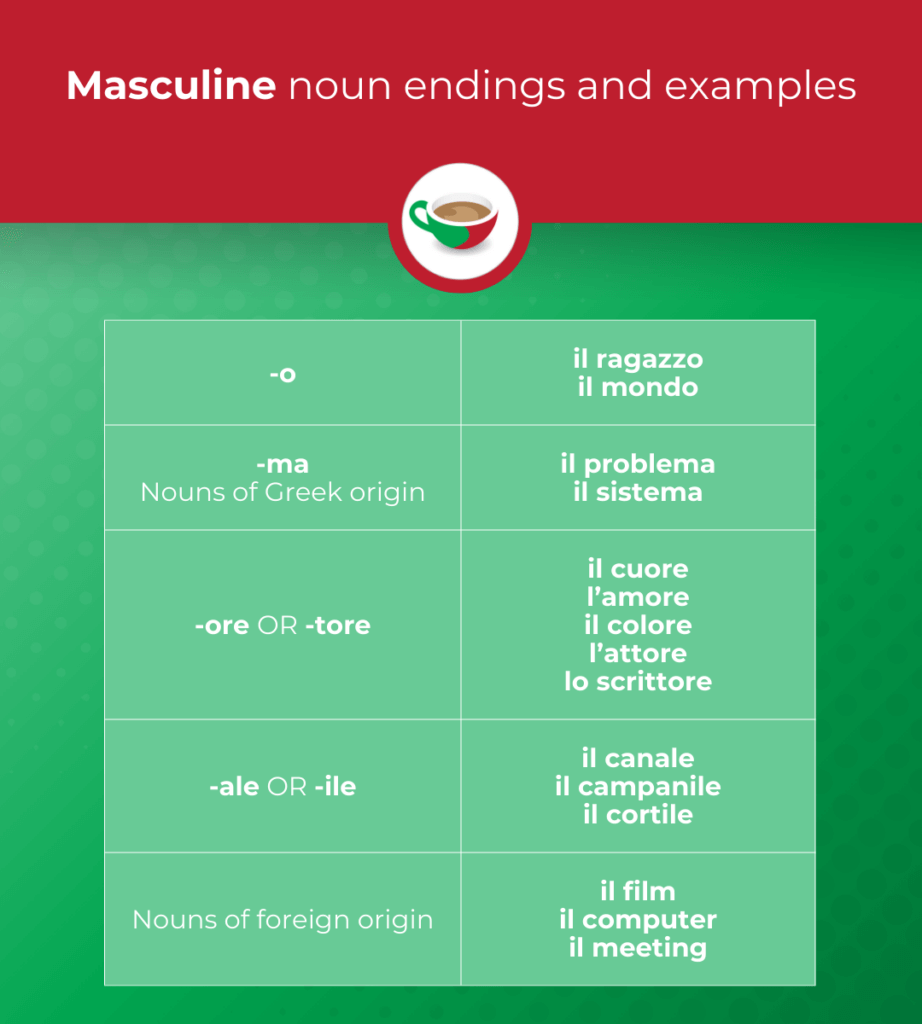Is there an easy way to know the gender of a noun in Italian?
You probably already know from your experience with Italian that it is a language that has grammatical gender. Every noun in Italian is either masculine or feminine.
Over time, you get to know what gender nouns are, the more you practise and use the words, and often you simply have to memorise the gender of the noun as you’re learning the word itself. However, the good news is that there are some shortcuts that you can learn!
The Coffee Break Italian Show is a podcast series of bite-sized, friendly conversations in which we demystify tricky Italian language topics. In the latest episode, Francesca and Maurizio share some tips and tricks to help you figure out the gender of a noun in Italian.
Continue reading to find out more and why not listen to the podcast episode as you go?
How a dictionary can help you
The best way to know the gender of nouns is to look them up in a dictionary. Next to any noun you will see either (m) for masculine or (f) for feminine.
However, we don’t always carry around a dictionary and sometimes our online dictionary app might not be loading, so let’s take a look at some other ways you can work out the gender of nouns in Italian.
Nouns ending in -o & -a
Our first rule is one that you’re likely to already be very familiar with. This is that the majority of nouns ending in -o are masculine, while the majority of those ending in –a are feminine. Let’s look at some examples:
ragazzo (m)
boy
ragazza (f)
girl
The correct articles to use with ragazzo are therefore il and un:
il ragazzo
the boy
un ragazzo
a boy
And the correct articles to use with ragazza are therefore la and una:
la ragazza
the girl
una ragazza
a girl
Some other examples are:
mondo (m)
world
natura (f)
nature
This is quite straightforward, but Francesca and Maurizio mention an exception to this rule. Let’s move onto this now.
Nouns ending in -ma
There are a number of nouns ending in -ma, which might lead you to think they are feminine because of their final -a, but they are actually masculine. These masculine nouns have a Greek origin, hence their unusual ending. For example:
problema (m)
problem
sistema (m)
system
Nouns ending in -si
There are also some nouns that end in -si and they also have a Greek origin. Usually, these nouns are feminine in Italian. Let’s see some examples:
crisi (f)
crisis
analisi (f)
analysis
tesi (f)
dissertation, thesis
Notice that the English equivalent is often a word ending in -is.
Nouns ending in -ore
You may know that there are some singular nouns in Italian ending in -e. These nouns can be either masculine or feminine. So, how can we determine their gender? For some nouns ending in -e, only the dictionary will tell you if they are masculine or feminine, but for many others the extended ending will be a useful indicator.
Let’s start with nouns ending in -ore. These are generally masculine. For example:
cuore (m)
heart
amore (m)
love
colore (m)
colour
attore (m)
(male) actor
scrittore (m)
(male) writer
Nouns ending in -trice
Pay attention to the previous two examples, attore and scrittore, which are both professions ending in -tore. When the masculine version of a profession ends in -tore, its feminine counterpart will end in -trice. For example:
attrice (f)
(female) actor
scrittrice (f)
(female) writer
Nouns ending in -ale & -ile
If a noun ends in -ale or –ile, it is most likely to be masculine. Here are some examples:
canale (m)
canal, channel
campanile (m)
bell tower
cortile (m)
backyard, courtyard
Nouns ending in -zione & -sione
If a noun ends in -zione or -sione, it is most likely to be feminine. Notice that the English equivalents of these nouns usually have the “-tion” ending. For example:
emozione (f)
emotion
stazione (f)
station
creazione (f)
creation
Nouns of foreign origin
What about nouns that are borrowed into Italian from other languages? Most of the time, these are considered masculine, especially if they end in a consonant. For example:
film (m)
film
computer (m)
computer
gossip (m)
gossip
meeting (m)
meeting
However, there are some exceptions here, as well, and some foreign nouns can be feminine. This can happen when the foreign noun is more strongly associated with its Italian equivalent and when the Italian equivalent is a feminine noun. Let’s see some examples:
call (f) / chiamata (f)
call
mail (f) / posta elettronica (f)
email
band (f) / banda (f)
band
If you’re in doubt, remember that the dictionary will always guide you in this process!
Over to you!
At the end of this episode, Francesca and Maurizio invite you to participate in a practice activity.
Can you determine the gender of the following nouns, based on what we have learned today? We’ve also taken the opportunity to practise some festive vocabulary, since this episode was first released during the holiday season!
The answers can be found at the end of the article.
- vigilia
- regalo
- decorazione
- panettone
If you found this article interesting, make sure you listen to the full podcast episode with Francesca and Maurizio on The Coffee Break Italian Show. We have many more episodes on useful topics for Italian learners, so make sure to subscribe to our podcast feed and our channel on YouTube to find others.
Plus! To get regular free Italian lessons in your inbox, you can sign up for our short (coffee-break-sized) email lessons that will help you improve your Italian. You will also hear from Mark, the founder of Coffee Break Languages, giving advice for language learners at any level. Sign up below!
Happy Coffee Breaking!
PS. Here are the answers to the challenge.
- vigilia (f) – eve, for example in vigilia di Natale (Christmas Eve)
- regalo (m) – present, gift
- decorazione (f) – decoration
- panettone (m) – traditional Italian Christmas cake





